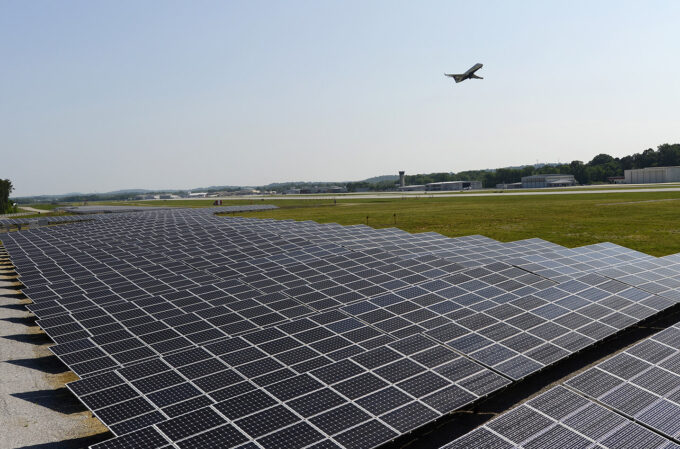In 1969, with industrial emissions causing smog so dense that it was sometimes difficult to see across the street, Chattanooga, TN was ranked as the most polluted U.S. city.
Today, Chattanooga has proven that such a negative environmental reputation can be reversed. One of the best examples of the city’s progress is a state-of-the-art solar power array at Chattanooga Metropolitan Airport (CHA) that produces 100% of the energy consumed by the airport.
The solar farm at Chattanooga Metro consists of 9,376 solar panels installed on a portion of the airfield that was deemed unusable for aviation purposes. Inman Solar of Atlanta, GA engineered the solar array to meet the FAA’s stringent requirements for building on airport property. The system cost approximately $10 million and was funded through several FAA grants. As a public service, a kiosk at the airport’s entrance displays the power system’s current and lifetime electrical energy production.
“As the first airport in the nation to generate enough solar energy to offset total power needs, we’re proud to serve as a model for sustainability for our community.”
Jack McAfee Vice President of Planning and Development, Chattanooga Metropolitan Airport
“It’s our shared responsibility to reduce our environmental footprint,” said Jack McAfee, the airport’s vice president of planning and development. “We encourage all airports to consider renewable energy alternatives, because all sustainability improvements do not require additional space. Our LEED-designated [Leadership in Energy and Environmental Design] facilities, storm water system, green infrastructure and electric car charging stations also play important roles in improving sustainability. As the first airport in the nation to generate enough solar energy to offset total power needs, we’re proud to serve as a model for sustainability for our community, and have been encouraged by other airports that have contacted us about implementing their own sustainability projects.”
“CHA’s high level of sustainability communicates its desire to be a responsible steward of the environment and a good neighbor to the community,” said Gregory Voos, CAM, NBAA’s Southeastern regional representative. “The positive relations garnered by the airport’s actions provide an example to business aircraft operators, as well commercial operators, to follow.”




 International Business Aviation Council Ltd.
International Business Aviation Council Ltd.